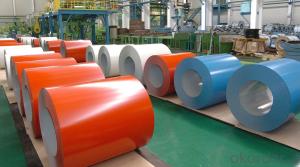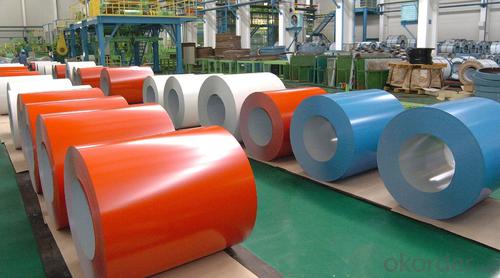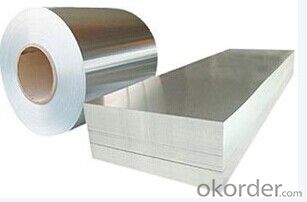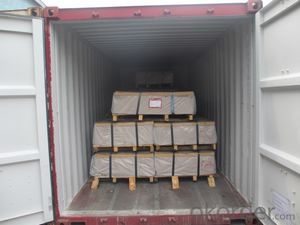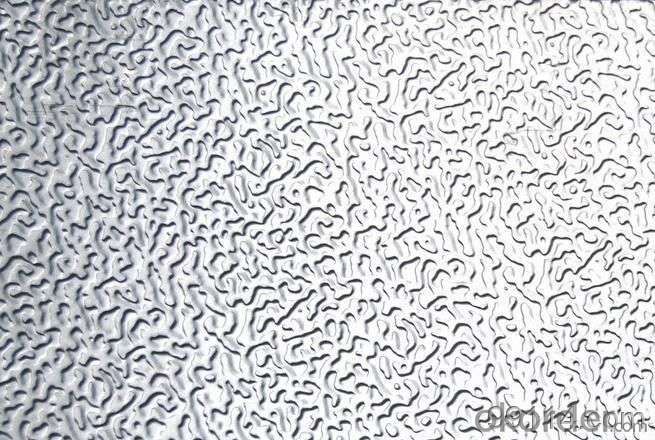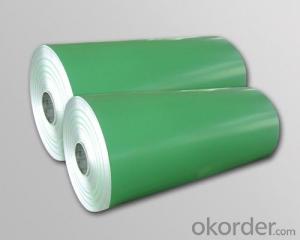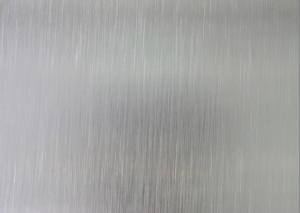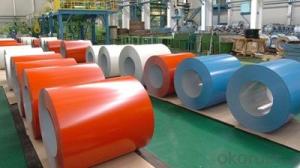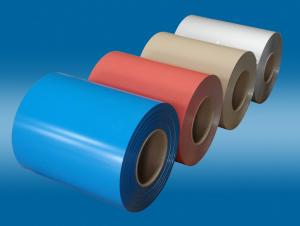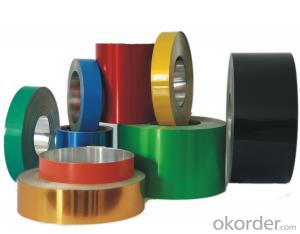Aluminum Coil - AA1100 H16 0.8mm PE Coating
- Loading Port:
- Shanghai
- Payment Terms:
- TT OR LC
- Min Order Qty:
- 20 m.t.
- Supply Capability:
- 8000000 m.t./month
OKorder Service Pledge
Quality Product, Order Online Tracking, Timely Delivery
OKorder Financial Service
Credit Rating, Credit Services, Credit Purchasing
You Might Also Like
supply Mill-finished / coated aluminum sheet/ coil:
Alloy: AA1050,1060,1100,1200,2024,3003,3304,3005,3015,5052,5086,5754,5083,6061,7050,7475,8011, etc
Temper: O, H14/16/18/22/24/32/ H112/H321/T6,T851,T7451,T7351, etc
Thickness: 0.02mm—20mm
Width: 100mm—2000mm (Can be slitted)
Notice: PE coating / PVDF coating / Embossment can be done if required.
- Q: Why is the aluminum roll upset?
- Mainly in the aluminum slitting process, for various reasons, does not meet the standards and specifications of products, can be used to roll the machine from the new trimming and slitting, winding up to meet customer needs of product specifications
- Q: Why is the hard drive made of aluminum? Why is steel not used, despite being cheaper?
- Aluminum does not rust or corrode under normal circumstances and if anodized it is already oxidized and covered with the second hardest naturally occurring material on earth alumina , in its gem form it is known as ruby or sapphire.
- Q: It's time for a new bike and I don't know enough about the pros and cons of aluminum vs. carbon fiber. I can get a low-end carbon bike or a high-end aluminum for about the same price, so the budget is not really a major issue. Any opinions would be appreciated.
- carbon is normally lighter but i would prefer the high end aluminum
- Q: is there any kind of solder or technique that can solder copper to aluminium? or is it just not possible!?
- piece okorder /... well actually near enough impossible but there are lots of interesting ways to fail on YouTube
- Q: Can aluminum coils be used in marine applications?
- Yes, aluminum coils can be used in marine applications. Aluminum is a popular choice for marine applications due to its excellent corrosion resistance, lightweight nature, and high strength-to-weight ratio. It is commonly used in the construction of boats, ships, and other marine structures. Aluminum coils are particularly useful in marine applications as they can be easily formed into various shapes and sizes, making them suitable for different parts and components in the marine industry. Additionally, aluminum coils can withstand harsh marine environments and are highly resistant to saltwater corrosion, which is a significant concern in marine applications. Overall, the use of aluminum coils in marine applications is a reliable and effective choice.
- Q: How do aluminum coils contribute to indoor air quality?
- Various ways are affected by the crucial role played by aluminum coils in maintaining and improving indoor air quality. Firstly, aluminum coils find common usage in HVAC systems, which are responsible for heating, ventilation, and air conditioning in buildings. These coils aid in the efficient transfer of heat and cooling, guaranteeing a comfortable indoor environment. By effectively regulating temperature and humidity, aluminum coils help in averting the growth of mold, mildew, and other harmful microorganisms that thrive in damp and warm conditions. As a result, the release of airborne spores and allergens that can have a negative impact on indoor air quality is prevented. Furthermore, aluminum coils exhibit high resistance to corrosion and do not easily accumulate dirt, dust, or debris. This characteristic is of utmost importance, as dirty coils can lead to reduced airflow and inefficient cooling or heating, ultimately resulting in poor air quality. By employing aluminum coils, HVAC systems can sustain optimal performance, ensuring proper air circulation and filtration. This assists in the elimination of pollutants, such as dust, pollen, pet dander, and volatile organic compounds (VOCs) from indoor air, thereby contributing to a healthier and cleaner environment. Another significant factor is that aluminum is a recyclable material, making it an environmentally friendly option. By choosing aluminum coils for HVAC systems, we contribute to waste reduction and the conservation of natural resources. This aligns with sustainable practices and supports endeavors to minimize the environmental impact of our indoor air conditioning systems. In conclusion, aluminum coils make a substantial contribution to indoor air quality by facilitating efficient temperature and humidity control, preventing the growth of harmful microorganisms, enabling proper air circulation, and facilitating effective filtration. Additionally, their durability and recyclability make them an outstanding choice for maintaining a healthy and sustainable indoor environment.
- Q: Automotive aluminum coil, using GB H22, what brand, what are the main ingredients?
- 5754-H22 aluminum sheet has the characteristics of medium strength, good corrosion resistance, weldability and easy processing. It is a typical alloy in Al-Mg (mg Al alloy) alloy.
- Q: How do aluminum coils perform in extreme weather conditions?
- Aluminum coils are known for their excellent performance in extreme weather conditions. Due to their inherent properties, aluminum coils are highly resistant to corrosion, making them ideal for use in areas with high humidity, coastal regions, and places prone to acid rain or industrial pollution. Additionally, aluminum coils have a high melting point, which allows them to withstand extreme heat without warping or deforming. In extremely cold weather, aluminum coils exhibit exceptional durability and do not become brittle like some other materials. They are capable of maintaining their structural integrity, ensuring optimal performance even in freezing temperatures. Moreover, aluminum coils have excellent thermal conductivity, making them efficient in transferring heat and defrosting capabilities, which is crucial for HVAC systems operating in cold weather conditions. In hot and humid climates, aluminum coils excel in resisting corrosion, preventing moisture buildup, and maintaining their efficiency. They are designed to withstand high humidity levels, preventing the growth of mold or bacteria that could compromise indoor air quality. The lightweight nature of aluminum coils also contributes to their ability to dissipate heat quickly, improving overall cooling performance and energy efficiency. Furthermore, aluminum coils are highly durable and can withstand extreme weather events such as hurricanes, strong winds, and hailstorms. They are designed to be robust and resistant to impact, ensuring that they can withstand harsh weather conditions without sustaining damage. Overall, aluminum coils have proven to be reliable and effective in extreme weather conditions, providing long-lasting performance and durability. Their resistance to corrosion, ability to withstand high and low temperatures, and capacity to withstand severe weather events make them an excellent choice for various applications, including HVAC systems, refrigeration units, and outdoor equipment.
- Q: What are the different protective film options for aluminum coils?
- Some different protective film options for aluminum coils include polyethylene films, polyvinyl chloride (PVC) films, and polypropylene films. These films are designed to provide temporary protection during transportation, handling, and storage, preventing scratches, abrasions, and other damages. The choice of protective film depends on factors such as the specific application, environmental conditions, and desired level of protection.
- Q: How do aluminum coils impact energy efficiency?
- Aluminum coils play a crucial role in enhancing energy efficiency in various applications. They are commonly used in heating, ventilation, and air conditioning (HVAC) systems, refrigerators, and heat pumps. The primary reason for their positive impact on energy efficiency is their excellent heat transfer properties. Aluminum is an excellent conductor of heat, which means it can quickly absorb and dissipate thermal energy. When used in HVAC systems, aluminum coils facilitate the transfer of heat between the indoor and outdoor units. This efficient heat transfer reduces the workload on the system, allowing it to operate more efficiently and consume less energy. Additionally, aluminum coils are lightweight and have a high surface area, which further enhances their heat transfer capabilities. Their lightweight nature reduces the overall weight of the system, resulting in lower energy consumption. The increased surface area allows for greater contact between the air and the coils, promoting more effective heat exchange. Furthermore, aluminum coils are resistant to corrosion, which is a common issue in HVAC systems. Corrosion can negatively impact the efficiency of heat transfer, leading to increased energy consumption. Aluminum coils' resistance to corrosion ensures long-lasting performance, maintaining their efficiency and reducing the need for frequent maintenance or replacement. In summary, aluminum coils contribute significantly to energy efficiency by facilitating efficient heat transfer, reducing the workload on HVAC systems, and minimizing energy consumption. Their lightweight nature, high surface area, and corrosion resistance further enhance their positive impact on energy efficiency.
Send your message to us
Aluminum Coil - AA1100 H16 0.8mm PE Coating
- Loading Port:
- Shanghai
- Payment Terms:
- TT OR LC
- Min Order Qty:
- 20 m.t.
- Supply Capability:
- 8000000 m.t./month
OKorder Service Pledge
Quality Product, Order Online Tracking, Timely Delivery
OKorder Financial Service
Credit Rating, Credit Services, Credit Purchasing
Similar products
Hot products
Hot Searches
Related keywords
